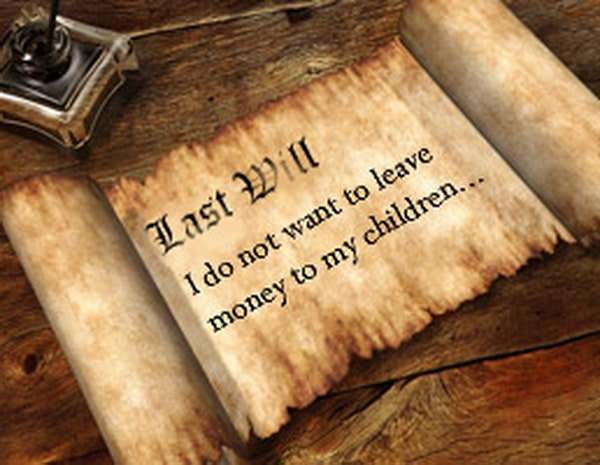Philippines: Disinheritance
Disinheritance: Grounds for Descendants and Ascendants

If you belong to wealthy or middle class family with a lot of properties ranging from real estate, financial assets, agricultural land or businesses, matters regarding inheritance, will and legitime are quite a controversial issue especially when there is a dispute among the testator and his heirs.
In the Philippines, in the event that a person dies, his compulsory heirs have rights and claims to his estate, whether or not the person has made a last will and testament. The New Civil Code defines compulsory heirs as (1) Legitimate children and descendants, with respect to their legitimate parents and ascendants; (2) In default of the foregoing, legitimate parents and ascendants, with respect to their legitimate children and descendants; (3) The widow or widower; (4) Acknowledged natural children, and natural children by legal fiction; and (5) Other illegitimate children. Therefore, compulsory heirs cannot be deprived of their right to inherit, even if the testator has explicitly excluded them from his will, as they are protected under the New Civil Code, unless they have been duly disinherited by the testator.
Disinheritance refers to an act by which the owner of an estate deprives a person who would otherwise be his heir, or have the right to inherit it. It can be made only through a Will wherein the legal cause thereof shall be specified. It must be expressly stated in the Will and not merely implied, total in application, and the heir whose share is disinherited must be specifically identified.
But in order to make the disinheritance valid and binding, the testator cannot disinherit an heir as he merely wishes to, just to favor the other heirs. The legal cause of disinheritance shall be one authorized by law or enumerated by law; otherwise, the disinheritance is not operative. So if you have a favorite heir like a son and wants him to solely inherit all of your properties, expressly excluding the others, you can do so only if there is explicit disinheritance of the others such that the grounds for disinheritance being lawful.
If the disinherited heir should deny the cause of disinheritance, the burden of proving the truth of the cause for the disinheritance shall rest upon the other heirs of the testator.
Disinheritance of Children and Descendants (Article 919)

The following shall be sufficient causes to disinherit the testator’s children and descendants, legitimate as well as illegitimate.
When:
- A child or descendant has been found guilty of an attempt against the life of the testator, his or her spouse, descendants or ascendants;
- A child or descendant has accused the testator for a crime for which the law prescribes imprisonment for six years or more, if the accusation has been found groundless;
- A child or descendant has been convicted of adultery or concubinage with the spouse of the testator;
- A child or descendant by fraud, violence, intimidation, or undue influence causes the testator to make a will or to change one already made;
- There is a refusal without justifiable cause to support the parent or ascendant who disinherits such child or descendant;
- There is maltreatment of the testator by word or deed, by the child or descendant;
- A child or descendant leads a dishonorable or disgraceful life; and
- There is a conviction of a crime which carries with it the penalty of civil interdiction
Disinheritance of Parents or Ascendants (Article 920)

The following shall be sufficient causes to disinherit the testator’s parents or ascendants, whether legitimate or illegitimate.
When:
- The parents have abandoned their children or induced their daughters to live a corrupt or immoral life, or attempted against their virtue;
- The parent or descendant has been convicted of an attempt against the life of the testator, his/her spouse, descendants, or ascendants;
- The parent or ascendant has accused the testator of a crime for which the law prescribes imprisonment for six years or more, if the accusation has been found to be false;
- The parent or ascendant has been convicted of adultery or concubinage with the spouse of the testator;
- The parent or ascendant by fraud, violence, intimidation, or undue influence causes the testator to make a will or to change one already made;
- The loss of parental authority for causes is specified in this Code;
- There is refusal to support the children or descendants without justifiable cause; and
- There is an attempt by one of the parent against the life of the other; unless there has been reconciliation between them.
As long as the grounds for disinheritance are among those enumerated by the Law, one can be duly stripped off of his claims as heir of the testator.
In the event that you have been unlawfully deprived of your right as heir, due to disinheritance but on grounds which does not constitute of those enumerated above, immediately seek advice and help from a competent and credible lawyer. Know your rights and fight for it. Don’t let ignorance take the way and let people take advantage of you.

Source: Civil Code of the Philippines
Your Lovely Accountant Steemian
